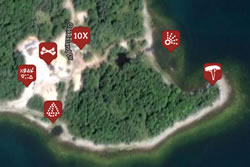 Sir Francis Bacon (c. 1561 – 1626) is an enigmatic character which seems perfectly suited to his fascination with ciphers and codes. Baconians, as his devotees are known, also contend that he was the author of Shakespeare's works (as well as other contemporary writers). Original manuscripts have never been found and are thought to be hidden in a chamber beneath Oak Island. Bacon, it is said, stated that he would be "known for who he really is long after his death".
Sir Francis Bacon (c. 1561 – 1626) is an enigmatic character which seems perfectly suited to his fascination with ciphers and codes. Baconians, as his devotees are known, also contend that he was the author of Shakespeare's works (as well as other contemporary writers). Original manuscripts have never been found and are thought to be hidden in a chamber beneath Oak Island. Bacon, it is said, stated that he would be "known for who he really is long after his death".
Add to that Bacon's experiments with preserving documents in mercury which dovetails nicely with the cache of empty flasks with traces of mercury discovered during early searches on Oak Island. He was also an initiate of the Order of the Knights Templar.
Finally, there is Bacon's servant/understudy, Mr. Thomas Bushell (c. 1593 – 1674) who successfully recovered a number of flooded mines with the able assistance of his Cornish miners. Bushell established and managed a Royal mint in Wales and defended the island of Lundy (the largest island in the Bristol Channel) for the Royalists. The island was surrendered on 24 February 1647 and Bushell went into "hiding", resurfacing in about 1652.
There are many interesting connections or coincidences presented by this theory.




